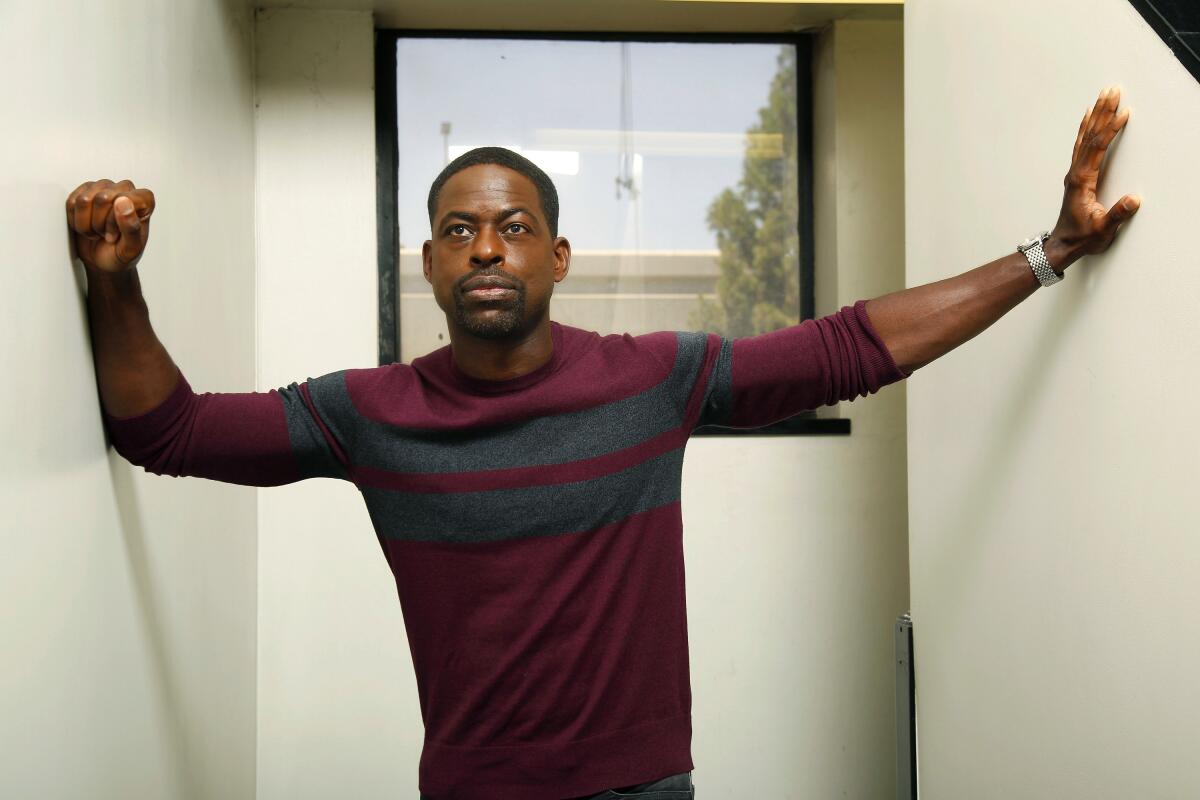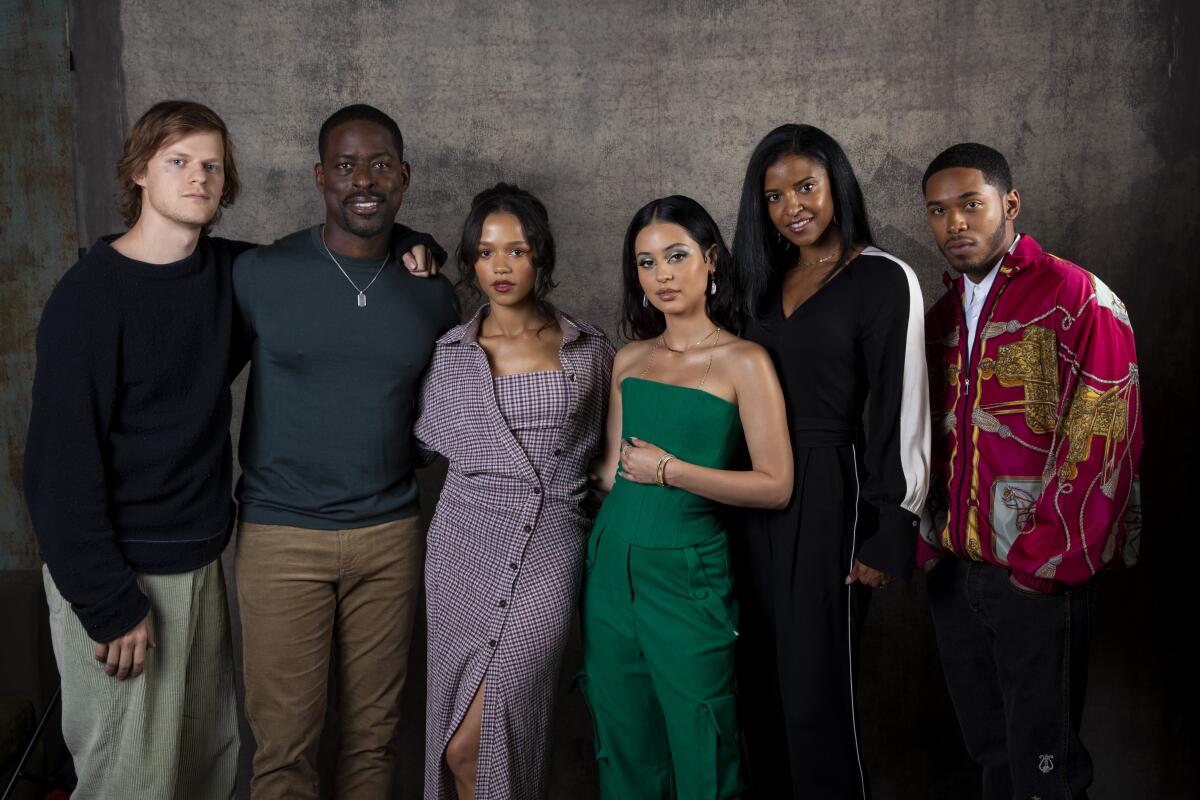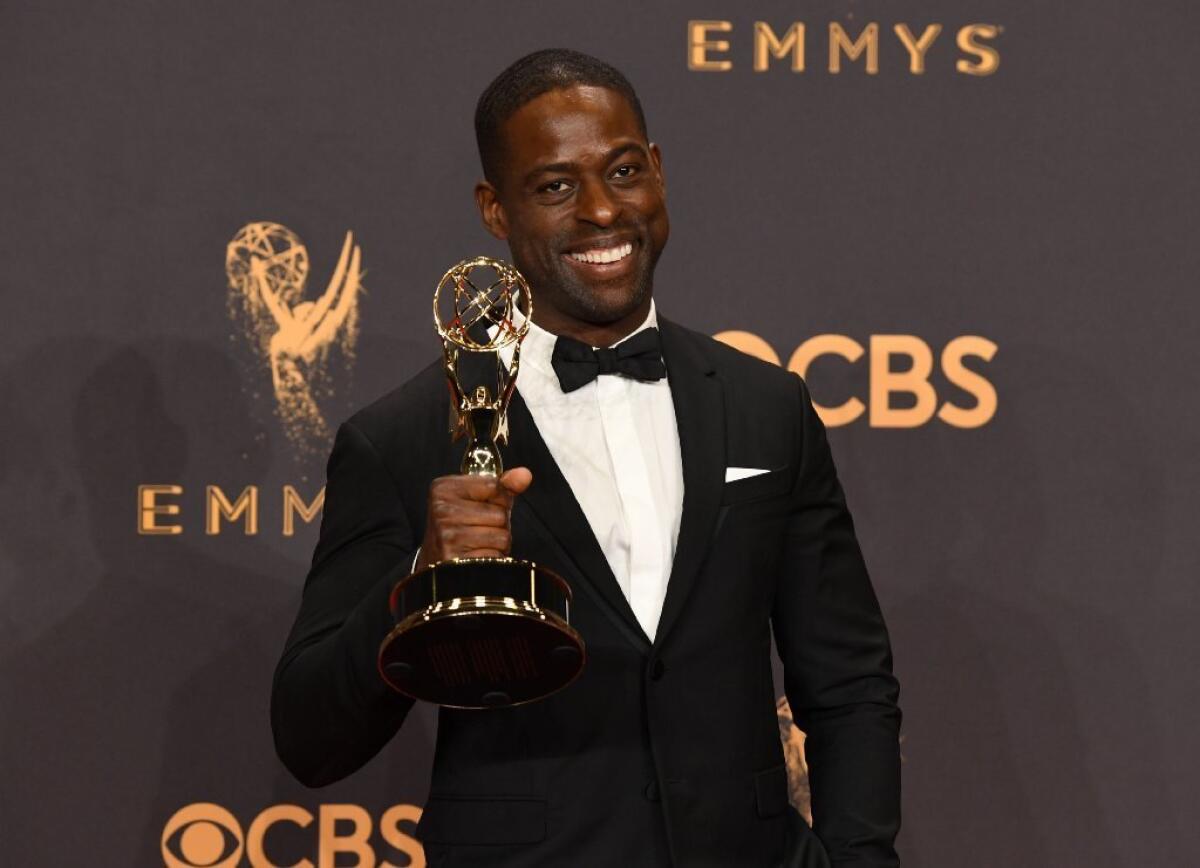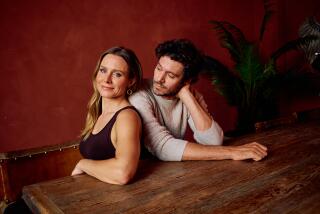Sterling K. Brown on what scared him about ‘Waves,’ and his most harrowing career move

When fans see Sterling K. Brown on the big screen in A24’s acclaimed drama “Waves,” they’ll meet a very different family man from the one he plays on TV.
For four seasons and counting on the hit NBC show “This Is Us,” he’s brought sensitivity to Randall Pearson, the loving father and husband whose desire to please masks a debilitating battle with anxiety.
In “Waves,” written and directed by Trey Edward Shults (“Krisha,” “It Comes at Night”) and opening Nov. 15, the Golden Globe and two-time Emmy winner puts a much tougher face on fatherhood as the tightly wound patriarch of a suburban South Florida family thrust suddenly into tragedy and crisis.
“For me it’s about, how does somebody love?” mused Brown, 43, between bites of breakfast on a recent morning in Los Angeles, considering the emotional gulf between Randall on “This Is Us” and Ronald Williams, the iron-pumping alpha dad in “Waves.”
“Randall wears his heart on his sleeve; he’s wide open,” he offered. “He wants everybody to be happy all the time, and he takes that on, and that can be overwhelming.”
In “Waves,” Brown’s Ronald is a man confronting the hard truth that the pressures he’s inflicted on others have contributed to his own family’s fracture — particularly when it comes to his teenage son, wrestler Tyler (Kelvin Harrison Jr.), whom he pushes to perfection at all costs, and his quietly watchful daughter, Emily (Taylor Russell), whom he all but ignores until it’s too late.
Ronald knows the fragility of family, having lost his first wife before remarrying Catherine (Renée Elise Goldsberry), Tyler and Emily’s stepmother. Brown slipped into the first-person perspective of his “Waves” character, who sees himself as a caring father even if he’s blind to the toxic masculinity that fuels his tough love.
“And I’m in Florida,” he said. “I’ve seen black boys lose their lives. So this child [Tyler], not only do I want him to excel — I want him to return home.”

Race is a present but unspoken current that runs through “Waves” — and the reason why, at first, Brown candidly says he wasn’t sure he should take on the role.
Originally written from semiautobiographical elements by Shults, who is white, the project took on more complex dimensions when the filmmaker cast rising actor Kelvin Harrison Jr. who’d starred in his 2017 psychological horror film “It Comes at Night.”
Once Harrison signed on to play Tyler, the story became one of an African American family struggling to heal after a shocking act of violence. “Are we adding to a stereotype that’s already incredibly destructive?” Brown wondered. Over lunch with Harrison at one of his favorite Los Angeles cafes, Brown decided to do the film.
“I wanted to talk to him about it too, because I wanted to make sure he was going into it with eyes wide open,” Brown explained. “Once you do it, it’s not yours anymore. It belongs to the audience. And however they respond, you have to be willing to accept that.
“Waves” and “Just Mercy” directors Trey Edward Shults and Destin Daniel Cretton bring tears and traumas to Toronto, while the terrific Romanian documentary “Collective” strikes a nerve.
“The fears ultimately felt like a reason why I should do it [rather] than why I should step away from it,” he said, “because I feel like this father is afraid for his child.” Plus, he felt an immediate connection to Harrison, who was already immersed in wrestling training when they had their first meeting.
On set in Florida filming the cast’s first scene together, as Harrison described it, Brown spawned a spontaneous moment of friendly father-son one-upmanship that instantly highlights the tensions brewing between the Williams men.
“He’s intense and I love it,” said Harrison of Brown. “He came in hot that morning and he was ready to play. Someone like Sterling is so charismatic that he just draws you in; you just want to fight him. He’s playful, he’s like a German shepherd to me — strong and beautiful but at the same time really fun. You just want to wrestle.”
That’s what the actors did as the camera rolled and their banter gave way to a table-clearing arm-wrestling challenge. “Sterling goes, ‘Let’s go’ and I looked at him and said, ‘Let’s GO,’” said Harrison. “You look him in the eye and think, OK, I’m going to top that energy.”
Tragically, it’s that aggressive machismo that trickles down through the family, with devastating results. Brown, who has sons ages 4 and 8 with fellow actor Ryan Michelle Bathe, found he understood the parental anxieties behind Ronald’s domineering ways, and the search for healing that follows the film’s gutting midpoint crescendo.
He considered that the fictional Ronald might benefit from watching Randall’s journey on “This Is Us” — an arc that has led Brown to foster dialogues about mental health to his Twitter followers — and let out a roaring, mellifluous laugh.
“I can totally see Catherine, like, ‘You’ve got to check out this show,’ and him saying, ‘Let me get a few reps in first.’”
After 15 years as a professional actor, Sterling K.
It was only a few days after Brown won his first Emmy in 2016, for his breakout portrayal of attorney Christopher Darden in “American Crime Story: The People vs. O.J. Simpson,” that he debuted on TV screens as Randall Pearson on the first season of “This Is Us,” for which he would win his second Emmy and the Golden Globe.
The years since have been stacked with TV and film appearances including “Marshall,” “Black Panther,” “The Predator” and “The Angry Birds Movie 2.” This holiday season, a week after “Waves” debuts in theaters, he’ll lend his voice to the Nov. 22 animated adventure “Frozen II,” the sequel to Disney’s 2013 $1.2-billion megahit “Frozen.”
Set three years after the events of “Frozen,” which won the 2014 Academy Award for animated feature and original song, “Frozen II” finds Elsa drawn out of her happily-ever-after life by a strange voice that calls to her from the north.
Brown joins the cast as new character Lt. Mattias, the leader of a unit of soldiers, who has mysterious ties to Elsa and Anna’s family. He hasn’t seen the final film yet but described how the bits and pieces of footage glimpsed while recording with directors Chris Buck and Jennifer Lee brought the unusual process of animated filmmaking to life.
“When you’re the vocal talent you go in, you do a few hours, then you have weeks off ... [you’re recording] probably four to five hours at the most in the booth at a time,” he said. “And you’re just reading with Chris and Jen, who are awesome. Short of actually getting to play with your actual castmates, they give the best reads that make you laugh and give you something to respond to. Then you see it put together and you go, ‘Huh — this works.’
“It’s crazy! People are working there around the clock, they have music pumping, they’ll bring in dogs for people to pet because it lifts people’s morale,” he said, a twinkle in his eye. “Yeah, the house the Mouse built thinks of everything.”
He played coy on whether he sings in the film alongside Idina Menzel, Kristen Bell and Josh Gad — but teased his upcoming guest stint as a musician on the upcoming season of Amazon’s “The Marvelous Mrs. Maisel” (streaming Dec. 6), a role opposite Rachel Brosnahan that was written for him. “I can carry a tune without embarrassment,” he said with a smile.
And yet, he admits, when he first joined Goldsberry, Harrison, Russell and director Shults at a burger joint in Hollywood, Florida, to begin work on “Waves,” there was one person he wouldn’t sing in front of.
“I had seen Renée in ‘Hamilton’ and she was extraordinary, obviously, Tony Award winner that she is,” he said of Goldsberry. “I had a big talent crush to begin with. She comes to the dinner and I literally start playing ‘Hamilton’ for her — not singing, because I didn’t want to sing terribly over her exquisite vocals — but I lip-synched her singing ‘It’s Quiet Uptown.’ Totally fan-boyed out!”

Brown’s busy current slate includes his ongoing arc on “This Is Us,” which was renewed for three more seasons in May, as well as the film and TV projects he is developing for his own production company, Indian Meadows, named for his St. Louis hometown so that, according to Brown, “I never forget where I come from.”
As part of the company’s mission, he says he is guided by the idea of “intelligent diversity.” “I want to see people of color and marginalized voices front and center,” he said. “African American, obviously, but whether that’s of the LGBTQ community, Asian or Latinx, I just want to make sure that we’re not just the cool sidekicks or whatever but that the stories are about us.”
The power of onscreen representation is undeniable, he added. “You go long enough without seeing yourself and you can fool yourself into thinking your life doesn’t matter, or your story doesn’t have import.”
Even in the midst of his current success, he lights up revisiting the glory days of his prefame working actor life, such as the time he did an off-Broadway show with Al Pacino, Chazz Palminteri, Steve Buscemi, Paul Giamatti, Billy Crudup and Linda Emond — “It was a stupid cast, and me,” he exclaimed.
And his career as a screen actor wasn’t always so blessed. After landing his first film role in the 2002 romantic drama “Brown Sugar,” he remembered, he proudly went with his mother and sister to see it in a theater — only to realize he’d been cut out of the movie.
“I had a scene with Method Man and Sanaa Lathan that wound up on the editing room floor,” said Brown. “The movie was over and I was like, ‘Ah ... I got cut.’ They were like, ‘Were you the dude playing basketball in the back?’ I was like, ‘No, Mama. That wasn’t me.’”

He grinned, assessing the professional highs and lows he’s amassed in his career to date. Of it all — from theater gigs to TV stardom to film, the awards stages and the one time he reluctantly ate frozen raccoon while guest-appearing on the survival show “Running Wild With Bear Grylls” — the most daunting moment, hands down, happened in the summer of 2018, right before he began filming “Waves.”
He had been enlisted to give the commencement speech at Stanford University, his alma mater. “It’s the most harrowing thing I’ve done,” said Brown.
“You know what it’s like to be in that audience! You want to hear something that’s going to inspire people,” he said. “You know the kinds of pressures students put on themselves in that environment, and you want to give them permission to fail, but fail at something that they love and not follow some predetermined course of action.
“There are so many things that can bring you joy other than the things you think you should be doing,” he continued, reflecting on what that’s meant to him. “It’s been a good few years. I hope it continues. I love what I do. And if I didn’t love it for the first 13 years of my career, I would have left it a long time ago. But in relative obscurity, I had joy.
“I don’t think there’s anything else I’m really equipped to do at this point,” he added with a smile, “so I might as well roll with it.”
More to Read
Only good movies
Get the Indie Focus newsletter, Mark Olsen's weekly guide to the world of cinema.
You may occasionally receive promotional content from the Los Angeles Times.








